
International Journal of Hepatobiliary and Pancreatic Diseases
Scope & Guideline
Elevating Standards in Hepatology Research and Practice
Introduction
Aims and Scopes
- Hepatobiliary and Pancreatic Oncology:
The journal emphasizes research related to cancers of the liver and pancreas, including studies on unique presentations, metastasis, and treatment outcomes. - Pathogenesis and Genetic Factors:
There is a significant focus on the underlying genetic and biochemical mechanisms that contribute to diseases such as cholangiocarcinoma, indicating the journal's commitment to understanding disease etiology. - Clinical Case Studies and Reviews:
The publication frequently includes case reports and comprehensive reviews, providing insights into rare conditions and their management, which can be critical for practitioners. - Predictive and Diagnostic Studies:
Research on the predictive value of clinical tests and outcomes, such as liver function tests in the context of choledocholithiasis, reflects the journal's aim to enhance clinical decision-making. - Surgical and Therapeutic Interventions:
The journal covers various surgical techniques and therapeutic strategies, focusing on improving patient outcomes in hepatobiliary and pancreatic surgeries.
Trending and Emerging
- Spontaneous Regression in Hepatocellular Carcinoma:
The exploration of spontaneous regression in hepatocellular carcinoma highlights a growing interest in understanding unusual clinical phenomena and their implications for treatment. - Molecular and Genetic Insights:
There is an emerging trend towards investigating the genetic and biochemical factors influencing hepatobiliary and pancreatic diseases, emphasizing personalized medicine and targeted therapies. - Multicenter and Cohort Studies:
The rise of multicenter studies and large cohort analyses indicates a trend towards more robust and generalizable findings that can influence clinical practice on a broader scale. - Innovative Imaging and Diagnostic Techniques:
Research involving advanced imaging techniques, such as the role of Ga DOTATOC in diagnosing pancreatic conditions, is becoming more prominent, showcasing the integration of technology in disease management.
Declining or Waning
- Traditional Surgical Techniques:
There seems to be a waning interest in traditional surgical techniques, with a shift towards more minimally invasive approaches and advanced therapeutic options. - General Hepatobiliary Disorders:
Research focusing broadly on general hepatobiliary conditions, rather than specific diseases or cancers, appears to be less frequent, suggesting a narrowing of focus to more specialized areas. - Pediatric Hepatology:
The publication of case reports related to pediatric liver diseases is decreasing, indicating a potential shift away from this demographic in recent studies.
Similar Journals
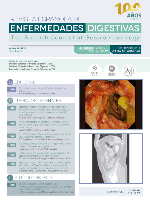
REVISTA ESPANOLA DE ENFERMEDADES DIGESTIVAS
Connecting researchers and clinicians for better outcomes.REVISTA ESPANOLA DE ENFERMEDADES DIGESTIVAS, a pivotal Open Access journal published by ARAN EDICIONES, S A, has been at the forefront of advancing the field of gastroenterology since its inception in 1990. With a robust commitment to disseminating high-quality research, the journal provides a platform for researchers, clinicians, and students to share innovative findings and insights concerning digestive diseases. The journal is characterized by its Q3 ranking in both Gastroenterology and Miscellaneous Medicine categories, indicative of its significant contributions to these fields, and is positioned within the 36th percentile of Scopus rankings for medicine related to gastroenterology. Based in Spain, REVISTA ESPANOLA DE ENFERMEDADES DIGESTIVAS has embraced the Open Access model since 2004, ensuring that its articles are readily available to a global audience without financial barriers. The journal not only supports academic discourse but also plays a crucial role in improving clinical practices and health outcomes related to digestive health.
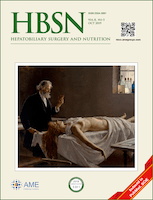
Hepatobiliary Surgery and Nutrition
Elevating standards in hepatobiliary surgery and nutrition.Hepatobiliary Surgery and Nutrition is a leading journal dedicated to advancing the fields of hepatobiliary surgery and nutritional science, published by AME Publishing Company. With a commitment to disseminate high-quality research, this journal serves as a vital platform for clinicians, researchers, and students alike to share their findings and insights related to liver and biliary health. The journal operates under an Open Access model, ensuring that cutting-edge research is readily available to a global audience. Although specific rankings and impact factors are currently not provided, the journal's focus on innovative surgical techniques and nutritional strategies underscores its importance in improving patient outcomes and shaping future practices in hepatobiliary medicine. Situated in Hong Kong, Hepatobiliary Surgery and Nutrition invites submissions that push the boundaries of knowledge in these crucial areas, fostering a collaborative environment for advancement in surgery and nutrition.
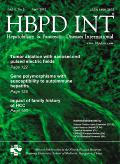
Hepatobiliary & Pancreatic Diseases International
Advancing knowledge in hepatobiliary and pancreatic health.Hepatobiliary & Pancreatic Diseases International, an esteemed journal published by Elsevier, stands as a vital resource within the field of gastroenterology and hepatology. Established in 2002, this journal has developed a significant reputation, currently ranked in the second quartile (Q2) in both categories as of 2023, showcasing its commitment to high-quality research and clinical studies. Based in Singapore, Hepatobiliary & Pancreatic Diseases International serves as an essential platform for researchers, clinicians, and healthcare professionals to share innovative findings, therapeutic approaches, and advancements in the understanding of hepatobiliary and pancreatic diseases. Although the journal does not currently offer Open Access, its rigorous peer-review process ensures that published articles maintain the highest scientific standards, fostering knowledge dissemination among the global research community. With a convergence period extending to 2024, this journal continues to play a pivotal role in enhancing the understanding and treatment of complex gastrointestinal conditions, making it a must-read for anyone engaged in this dynamic field.
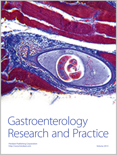
Gastroenterology Research and Practice
Empowering Healthcare with Open Access KnowledgeGastroenterology Research and Practice is a leading Open Access journal dedicated to advancing the field of gastroenterology and hepatology. Published by HINDAWI LTD, this journal offers a platform for researchers, clinicians, and healthcare professionals to share their findings and insights on cutting-edge topics in digestive health. With an ISSN of 1687-6121 and an E-ISSN of 1687-630X, it has established its significance within the academic community, evidenced by its ranking in the 2023 Scopus metrics, where it is positioned in the third quartile for both gastroenterology and hepatology disciplines. The journal is recognized for disseminating high-quality, peer-reviewed articles that contribute to the understanding of gastrointestinal disorders, therapeutic advancements, and innovative practices. Since its inception as an Open Access journal in 2008, Gastroenterology Research and Practice has removed barriers to access, ensuring that vital research reaches a global audience. This ongoing commitment to increasing accessibility, alongside its continuous publication from 2009 to 2024, underscores its importance as a resource for the academic and clinical communities striving to improve patient outcomes in digestive diseases.
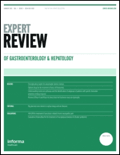
Expert Review of Gastroenterology & Hepatology
Where Expertise Meets Innovation in Gastroenterology & HepatologyExpert Review of Gastroenterology & Hepatology is a premier journal published by Taylor & Francis Ltd that aims to bridge the gap between clinical practice and research in the fields of gastroenterology and hepatology. Established in 2007, this journal has rapidly gained recognition, boasting a Q1 ranking in Gastroenterology and a Q2 ranking in Hepatology for 2023, while achieving impressive Scopus rankings of 31st and 25th respectively in these disciplines, placing it within the top 81st and 70th percentiles. The journal’s objective is to provide a comprehensive platform for the latest developments, innovative treatments, and critical reviews, catering to researchers, healthcare professionals, and students alike. Located in the United Kingdom, the journal does not operate under an open access model but ensures that its content is accessible to a global audience through institutional subscriptions. By consistently publishing high-impact reviews and articles, Expert Review of Gastroenterology & Hepatology solidifies its role as a vital resource in advancing knowledge and clinical practice within these challenging and evolving fields.
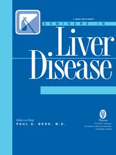
SEMINARS IN LIVER DISEASE
Exploring breakthroughs in hepatology since 1981.SEMINARS IN LIVER DISEASE is a premier journal dedicated to advancing the field of hepatology, published by THIEME MEDICAL PUBL INC. Established in 1981, it has become a respected resource within the academic community, providing high-quality peer-reviewed articles that cover a broad range of topics related to liver diseases. With an impressive impact factor and recognized as a Q1 journal in the hepatology category, it ranks 17th out of 82 journals in the field, placing it in the top 21% of its category according to Scopus rankings. Although it does not offer open access, the journal’s rigorous standards and extensive network ensure that it reaches a wide audience of clinicians, researchers, and students, fostering knowledge and innovation in liver disease management. The journal's objectives focus on disseminating critical insights and promoting informed discussions that can pave the way for future research and clinical advancements in hepatology.

Hepatology International
Connecting experts to revolutionize liver health.Hepatology International is a premier academic journal dedicated to advancing the field of liver research and hepatology. Published by SPRINGER, this journal boasts a prestigious Q1 ranking in Hepatology as of 2023, underscoring its commitment to high-quality research dissemination. The journal’s scope encompasses a wide range of topics related to liver disease, including clinical, translational, and basic science studies. With its impact factor reflecting its relevance and influence in the field, Hepatology International serves as an essential resource for researchers, clinicians, and students aiming to keep abreast of the latest developments and breakthroughs. Though traditionally a subscription-based journal, it offers a vast array of insightful articles that contribute significantly to our understanding of hepatological conditions. The journal continues its trajectory of growth since its inception in 2008, anticipating a convergence of knowledge and innovation through to 2024. Located in the heart of New York City, this journal not only represents a crucial platform for global hepatology research but also fosters a collaborative community of experts dedicated to improving liver health worldwide.

Translational Gastroenterology and Hepatology
Bridging Discovery and Care in Gastroenterology.Translational Gastroenterology and Hepatology, published by AME Publishing Company, stands as a pivotal platform for advancing the understanding and treatment of gastrointestinal and liver diseases. With its focus on translational research, this journal aims to bridge the gap between laboratory discoveries and clinical applications, thus fostering improvements in patient care. Although specific metrics like H-Index and Scopus ranks are currently unavailable, the journal is committed to maintaining high standards of scholarly communication and excellence. As an open-access publication, it ensures that valuable findings are readily accessible to a global audience, promoting collaboration and innovation among researchers, clinicians, and healthcare professionals invested in gastroenterology and hepatology. The journal's dedication to disseminating groundbreaking research makes it an essential resource for those seeking to stay at the forefront of these ever-evolving fields.
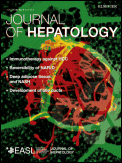
JOURNAL OF HEPATOLOGY
Empowering Medical Professionals with Premier ResearchJOURNAL OF HEPATOLOGY, published by Elsevier, stands as a preeminent source in the field of Hepatology, with its impact underscored by a remarkable 2023 Category Quartile of Q1 and a Scopus rank of 3rd out of 82 journals, placing it in the 96th percentile for the discipline. Since its inception in 1985, this journal has been a vital conduit for the dissemination of pioneering research, clinical studies, and reviews related to liver diseases and their impact on global health. Although it currently does not offer open access options, the journal is committed to providing top-tier content to its readership—researchers, medical professionals, and students—in order to advance knowledge and foster innovation in hepatology. With a broad and inclusive scope, it aims to cover significant breakthroughs, therapeutic advancements, and epidemiological studies, continually pushing the boundaries of understanding in liver health. The journal is based in Amsterdam, Netherlands, and remains an essential resource for those dedicated to the progression of hepatologic science.

Annals of Hepato-Biliary-Pancreatic Surgery
Exploring Breakthroughs in Surgical PracticeAnnals of Hepato-Biliary-Pancreatic Surgery is a leading academic journal dedicated to the fields of hepatobiliary and pancreatic surgery, contributing essential research and clinical insights to enhance surgical practices and patient outcomes. Published by the Korean Association of Hepato-Biliary-Pancreatic Surgery (KAHBPS), this journal serves as a vital resource for researchers, clinicians, and healthcare professionals interested in the latest advancements and methodologies within this specialized area. With an ISSN of 2508-5778 and an E-ISSN of 2508-5859, the journal presents a platform for high-quality, peer-reviewed articles that focus on the management and surgical techniques for liver, biliary, and pancreatic disorders. Although it currently offers limited open access options, the journal has been recognized in the 2023 Scopus Ranks, reflecting its influence in the medical community, particularly with a Q3 designation in Gastroenterology and Surgery. By fostering academic dialogue, the Annals of Hepato-Biliary-Pancreatic Surgery plays a crucial role in shaping evidence-based practice, making it indispensable for those engaged in this dynamic and evolving field.